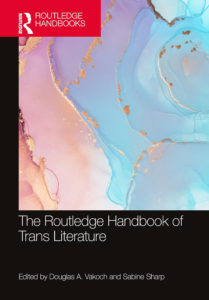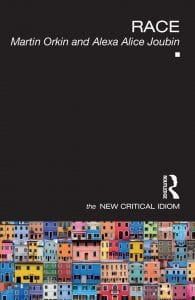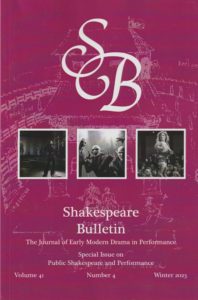When AI goes to theater with humans, it changes the dynamics of the social space. This article examines a case of audiences using an AI app on their phones to translate a sign language performance. Whom does the screen interface serve, and how do artificial intelligence tools affect theatrical publics across both the playing space and the playgoing space? Screens are a site where cultural and performative meanings are generated and negotiated.
Continue readingTag Archives: Global Shakespeare
Performativity and Trans Literature

What is trans-ness in gender? One way to understand it is through the notion of performativity—how language and nonverbal communication tacitly or overtly affects social actions—is the core of all utterances and imaginative literature. Using this notion we can re-interpret literature from a more inclusive perspective.
Continue readingContemporary Transgender Performance of Shakespeare

Cross-gender roles and performances permeate many of Shakespeare’s plays. Viola presents as pageboy Cesario for most of the dramatic action in Twelfth Night. Falstaff escapes Ford’s house as the Witch of Brainford in The Merry Wives of Windsor. Rosalind ventures into the woods as Ganymede in As You Like It. In that same comedy, Celia (as Aliena), Phoebe, and Audrey were also played by boy actors in Shakespeare’s time. In Cymbeline, British princess Imogen dresses as a male servant, Fidele, on their quest to find their husband among the Roman soldiers. Read the open-access Borrowers and Lenders special issue on contemporary transgender performance of Shakespeare. Continue reading
Soviet Shakespeares
 In Stalinist Russia, just a few years before the Great Purges, Maxim Gorkii encouraged USSR writers during an All-Union Congress of Soviet Writers in 1934 to emulate Shakespeare as a model of socialist realism. This is only one of the better-known landmarks of Shakespeare’s afterlife in the Soviet cultural sphere. While there were ideologically homogeneous approaches to Shakespeare, there were also debates about the value of Shakespeare after the First World War.
In Stalinist Russia, just a few years before the Great Purges, Maxim Gorkii encouraged USSR writers during an All-Union Congress of Soviet Writers in 1934 to emulate Shakespeare as a model of socialist realism. This is only one of the better-known landmarks of Shakespeare’s afterlife in the Soviet cultural sphere. While there were ideologically homogeneous approaches to Shakespeare, there were also debates about the value of Shakespeare after the First World War.
Due to Karl Marx’s frequent references in his political treatises, Shakespeare held a significant place in a number of communist and other left-authoritarian countries, including China and the USSR. And although there were themes in Shakespeare that turned out to be inconvenient for communist ideology, other Shakespearean plays were put into service. In Part I of this volume of the Yearbook, the special section of chapters explores the vicissitudes of artistic and political uses of Shakespeare in Soviet culture and ideology after the October Revolution in 1917, including in some of the continuing resonances of those uses since the collapse of the Soviet Union. And while the real and perceived resistance to prevailing ideologies of Soviet directors has tended to capture recent critical attention, there is a wide range of Soviet and post-Soviet interpretations of Shakespeare.
The Culture of Citation and Global Shakespeare
 Global Shakespeare can be studied through two interrelated concepts: performance as an act of citation and the ethics of citation. Appropriating the classics carries strong ethical implications. A crucial, ethical component of appropriation is one’s willingness to listen to and be subjected to the demands of others. These metaphorical citations create moments of self and mutual recognition. Seeing the others within is the first step toward seeing oneself in others’ eyes. The act of citation is founded upon the premise of one’s subjectivity, the subject who speaks, and the other’s voice that one is channeling, misrepresenting, or appropriating. Continue reading
Global Shakespeare can be studied through two interrelated concepts: performance as an act of citation and the ethics of citation. Appropriating the classics carries strong ethical implications. A crucial, ethical component of appropriation is one’s willingness to listen to and be subjected to the demands of others. These metaphorical citations create moments of self and mutual recognition. Seeing the others within is the first step toward seeing oneself in others’ eyes. The act of citation is founded upon the premise of one’s subjectivity, the subject who speaks, and the other’s voice that one is channeling, misrepresenting, or appropriating. Continue reading
Performing Commemoration: The Cultural Politics of Locating Tang Xianzu and Shakespeare

Cultural memory is actively constructed through embodied and political performances. Tang Xianzu and William Shakespeare, two “national poets” of unequal global stature, have recently become vehicles for British and Chinese cultural diplomacy and exchange during their quatercentenary in 2016. The culture of commemoration is a key factor in Tang’s and Shakespeare’s positions within world theatre. Performances of commemoration take a wide range of approaches from grass-root events to government-sponsored festivals. With a comparative scope that explores the afterlives of the two dramatists, this cluster of essays examines commemorative practices, the dynamics of artistic fame, comparability of different dramatic traditions, and transformations of performance styles in socio-historical contexts. Continue reading
Race and the Epistemologies of Otherness
 Excerpted from chapter 5 of Race by Martin Orkin and Alexa Alice Joubin. New Critical idiom Sereis. London: Routledge, 2019, pp. 193-227. Full text available online
Excerpted from chapter 5 of Race by Martin Orkin and Alexa Alice Joubin. New Critical idiom Sereis. London: Routledge, 2019, pp. 193-227. Full text available online
When confronted with the unknown, many societies tend to transfer observations of unfamiliar phenomena onto their mental map of what is already known. Race as a category is entangled with empirical knowledge, misinformation, and ideology, all of which seek to justify and sustain particular beliefs. Knowledge about otherness is socially constructed. Knowledge of race results from taxonomical observations made for colonial, medical, bureaucratic, or other purposes such as political movements. Continue reading
Global Shakespeare Criticism beyond the Nation-State
 On a sunny afternoon in early June, 2015, in a rehearsal room at the University of Warwick, director Tim Supple was rehearsing a globally envisioned King Lear with a group of talented actors from Ukraine, France, Nigeria, South Korea, India, and other parts of the world. When the actress Hong Hye Yeon playing Kent lamented in an aside in act 1 scene 4 that ‘[i]f but as well I other accents borrow, / That can my speech defuse’ in Korean (commenting on her and Kent’s disguise as part of the character’s effort to serve and assist Lear), the Ukrainian Lear (Oksana) responded powerfully in Russian. The cross-cultural dialogue was rich and beautifully embodied by the actors, their choice of modern editions or translations of the play, and their individual acting styles. The entire multinational cast was cooking up something delicious and original.
On a sunny afternoon in early June, 2015, in a rehearsal room at the University of Warwick, director Tim Supple was rehearsing a globally envisioned King Lear with a group of talented actors from Ukraine, France, Nigeria, South Korea, India, and other parts of the world. When the actress Hong Hye Yeon playing Kent lamented in an aside in act 1 scene 4 that ‘[i]f but as well I other accents borrow, / That can my speech defuse’ in Korean (commenting on her and Kent’s disguise as part of the character’s effort to serve and assist Lear), the Ukrainian Lear (Oksana) responded powerfully in Russian. The cross-cultural dialogue was rich and beautifully embodied by the actors, their choice of modern editions or translations of the play, and their individual acting styles. The entire multinational cast was cooking up something delicious and original.
During the brainstorming session that followed, Supple asked: ‘What came before language?’ The question was designed to draw attention to multilingual spaces on and off stage and the implications of acting and doing Shakespeare in such a space. He asked the group to take note of what we might find ‘when we move away from [verbal] language’ and of the ‘seeds of what we might find’. The answers the group came up with were diverse and rich: emotions; physicality; body language; that which incarnates the words; what lies under the words; and, last but not least, clarity of intent. In other words, there is a rich non-verbal language that come before and alongside utterance, which is particularly true in the case of non-English-language or multilingual performances of Shakespeare. Continue reading

